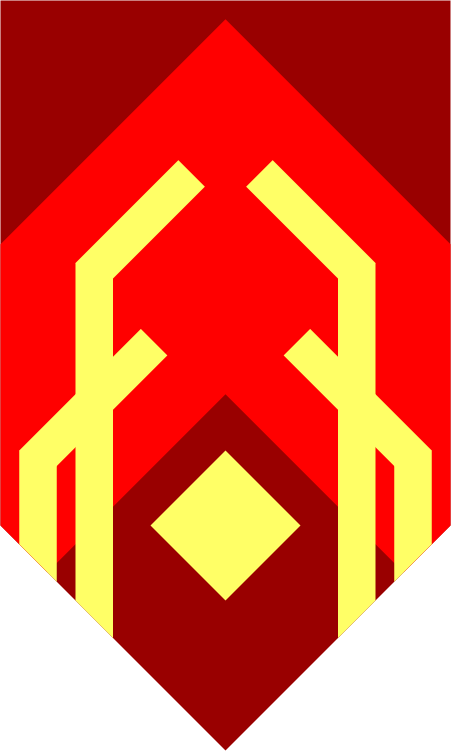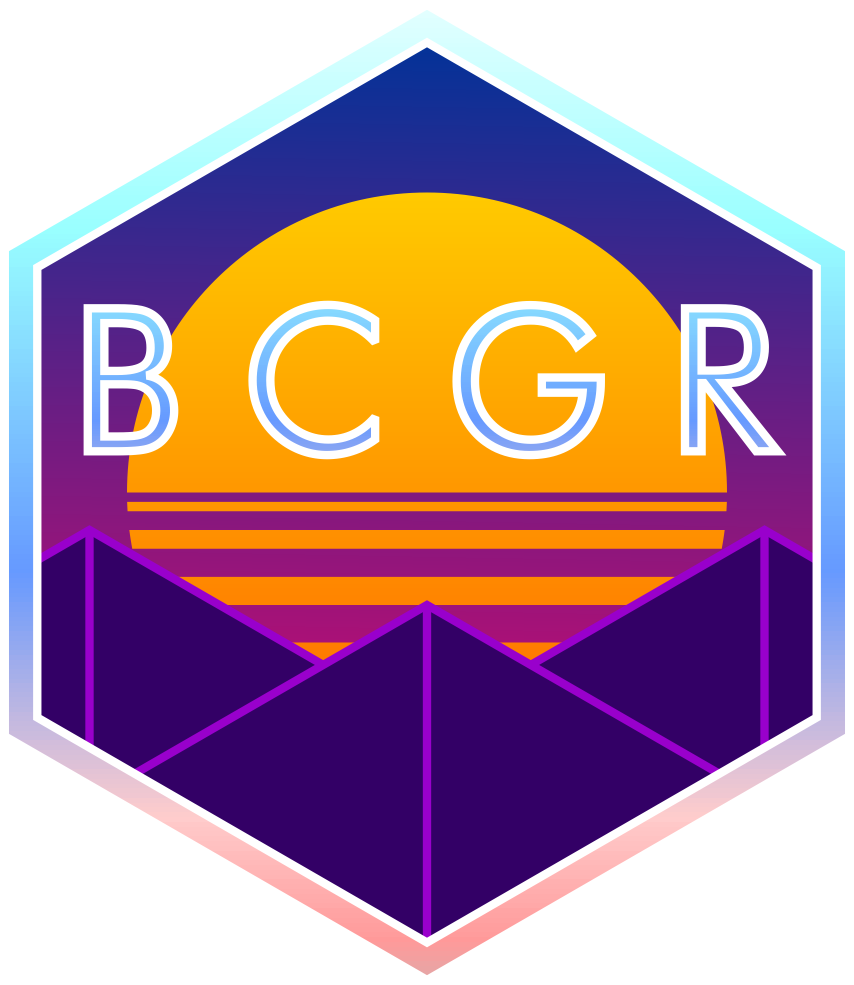Vozendi, also known simply as Voxelian, is the language of the
New Voxelian (ethnic group) people. It is a synthetic language, arising from numerous
Old Voxelian tribal languages which were merged in the times leading up to the founding of the Voxelian Empire. Described as 'velvety' by foreign listeners, Vozendi incorporates many voiced fricatives, sibilants, and glides, with the 'v' consonant being especially prominent.
Writing System
Vozendi's written form is known as River Script, with the name referring to the fact that its precursors were the scripts originating with tribes based on and around the Blue Silk River. River Script is an alphabet with a geometric motif, making extensive use of lines, the angles of equilateral triangles, and circular arcs. Vowels tend to emphasize arcs and circles, while consonants and consonant clusters tend to emphasize lines and angles. The curves and circles of River Script had an influence on the later development of Wadoona's own script, Juh'howe; even in their desire to contrast against the Voxelian Idealist Movement, the creators of Wadoona could not help but be shaped by the language of their upbringing.

by BCGR_Wurth
River Script was originally intended to be carved into rock or impressed into clay tablets, preventing many precise flourishes from being added until the advent of wax tablets and, eventually, ink pens. The legalistic order of the Voxelian Empire instituted in the aftermath of the
Old Voxelian Conquest, alongside increasing access to the
Incunabula of the House of the Unexpected due to the spread of
Church of the Unexpected, caused successive waves of growth in literacy among the Voxelian population. Printing techniques and the later invention of the typewriter have allowed for a plethora of fonts, and new Voxelian typists must often be coached on the necessity of consistent and legible font choices.
River Script is read left-to-right, then top-to-bottom.
As Vozendi is a hybridization of several now-extinct languages, it often has more than one term for a given concept. These different roots have aquired different shades of meaning over time, so word choice is important when one is trying to convey how they feel about a given topic. The 'imperial' register is broadly considered the essential form of Vozendi and it's vocabulary is the most popular in academic, scientific, and legal communications, as well as in the context of Vozendi foreign language education. For this last reason, speaking exclusively in the imperial register makes one appear humorless and overly formal to native speakers, often marking out the speaker as a foreigner.
The variety of terms available to fluent speakers makes Vozendi very useful as a vehicle for poetry and dramatic narration - appropriate for a culture so steeped in performance, spectacle, and the arts. Vozendi also makes heavy use of idiom to condense complex concepts, requiring a degree of inferrence and cultural knowledge to get the full breadth of meaning. Many of these idioms stretch back to the
Incunabula of the House of the Unexpected - the most famous and influential work of early Vozendi literature - meaning that members of the
Church of the Unexpected have an easier time becoming fluent in the language even if not from a related culture.
While it is largely vestigial - as modern Voxelians speak their minds freely - Vozendi features an agglutinative system of honorific affixes which results in longer terms for persons and places more honored than the speaker themselves. This system of honorifics occasionally still sees use as an indication of respect for the listener or as a method of expressing that one is in polite company - with an accompanying increase in speaking speed, as modified words can become quite lengthy to squeeze into the same amount of time.
Consonants: p, t, k, b, d, g, m, n, l, r, v, s, z, f, ʒ(zh), d͡ʒ(j), ʃ(sh), θ(th), ks(x), h
Vowels: a, e, i, o, u, j(y), w
Vozendi features a system of gemination that is typically denoted by a double letter (i.e. '
elledjet'). Geminates alone can sometimes change the definition of a word, but this effect has become more marginal as the language has developed - older words are more likely to be differentiated by geminates than newer words. Long-time members of the
Navigator's Guild often find their Vozendi degeminated as a result of exposure to the notably terse
Guild Pidgin.
Verbs in Vozendi are conjugated for tense, plurality, person, and gender of the object using infixes. Vozendi uses the imperfect, past, perfect, present, pluperfect, and future tenses, dividing time in to six relative segments - long before, before, leading up to, current to, immediately coming after, and coming well after the present - for 36 infixes in total. No infix being present indicates that the verb is in the infinitive (i.e. "to run"). Adding -(e)vo to the end of such an infinitive verb turns it into a command (i.e. "run!).
The gender, person, and plural conjugation of the verb must match the object except in the infinitive form (see Tenses).
Old Voxelian Proto-Elvoz featured additional consideration for social strata in the form of verb aspects for speaking with superiors and inferiors. These aspects largely died out due to admixture with languages with less vertical social structures despite the class stratification of the Voxelian Empire itself. In modern times, using this form of address makes one seem old-fashioned or overly formal, but is not outright discouraged except due to the extra complexity it entails: another 12 noun particles and 72 verb infixes.
Vozendi obeys OVS sentence construction (i.e. "I enjoy the park"). Adjectives and adverbs preceed the parts of speech they modify.
Grammatical gender is often indicated with a suffix particle on nouns and may be either male (-ve) or female (-la), though the gender is implicit on many nouns (i.e. a
djet is considered grammatically male even in the absense of a particle, while an
elledjet is considered grammatically female). Adding an -(e)n particle to a male noun (i.e. 'djeten' or 'rodserven') or an -(a)n particle to a female noun (i.e. 'elledjetan' and 'levrolan') makes it plural. Groupings are assigned the gender appropriate to the majority of members if discernable or whichever applies to the class of noun if not discernable. The subject is usually marked with a -(e/a)zhu suffix. When a sentence features extensive recursion or possessive statements, the object may be marked with an -(e/a)lo suffix to further delineate it from other nouns in the sentence.






Comments